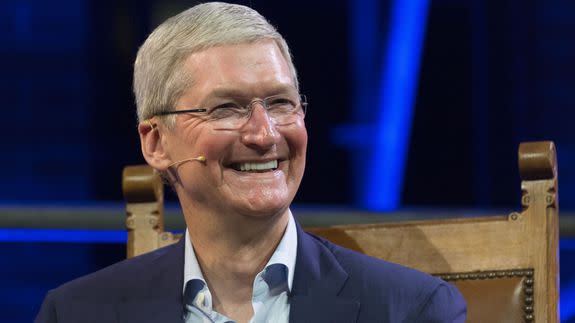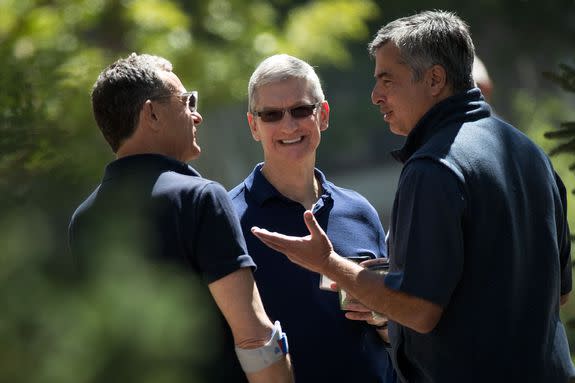Tim Cook proves Apple can survive without Steve Jobs

“Apple will be fine.”
That’s what I wrote five years ago this Wednesday when Apple co-founder and CEO Steve Jobs, then in ill health, reluctantly stepped down as and handed over the reins to COO Tim Cook. It was Aug. 24, 2011.
Cook was largely unknown to the public until 2009, when he temporarily replaced Steve Jobs as chief executive. No one expected big changes back then. Jobs returned to the helm in six months and in 2010 delivered the first iPad.
SEE ALSO: It's crunch time for Apple and the iPhone 7
This time, though, was different. There was no “temporary” in the announcement. Jobs had resigned and Cook was the “new” CEO.
Yet I still wasn’t concerned.
Some people believed that an Apple without its creator could not survive. Cook has proven those people wrong. At the time of Jobs death on October 6, 2011 (just weeks after his resignation), Apple was worth roughly $350 billion. The company is now worth well over half a trillion dollars.
Even though Alphabet recently surpassed Apple's market cap, I think it’s fair to say that Apple’s success has continued under Cook. That said, I’m not sure it’s the same company.
Tim Cook as catalyst
Where Steve Jobs' Apple took big risks and introduced new products and categories, Cook’s Apple is more likely to build on previous success. Jobs tended to build vertically, while Cook has often expanded the product line horizontally.
Before Cook took over, Apple had one iPhone and one iPad. Variety could be found in the more august iPod line and in laptops and all-in-one desktops. Starting with the iPhone 5C, Cook has offered a wider and wider array of iPhone choices. There are now three models to choose from: iPhone 6s, 6s Plus and SE (the company could introduce three new iPhones next month). On the iPad front, we now have four options, ranging from the giant and powerful iPad Pro 12.9 down to the tiny-ish iPad Mini 2.

Image: Drew Angerer/Getty Images
Time and time again, Cook has proven he’s about choice. I think he’s also shown that he’s more interested in reacting to market forces and interests than Steve Jobs ever was.
Unlike Jobs, who had the benefit of introducing the iPhone and iPad to markets that really had nothing else quite like them, Cook has had to contend with domestic market saturation. As a result, the global market has shifted to the center of the market bullseye. Cook often talks about growth opportunities in India, Brazil, China and Russia. That’s not just lip-service, He makes products like the iPhone C and SE that, I believe, he thinks these emerging markets will love.
Who is he?
Though I saw Jobs on stage and from a distance in person on a number of occasions, we never spoke directly and, to me, he retained a sort of mythic quality. Jobs came across as smart, dynamic and impatient. I would not have called him personable.
I’ve had the opportunity to see Tim Cook on stage numerous times, as well, but have also chatted with him in person. Cook is smart, incisive, open and gracious. He’s more engaged with the world and its problems than I think Jobs was. That has clearly rubbed off on Apple and its products.
The company’s commitment to environmental friendliness, which Jobs (in my opinion) grudgingly unveiled in 2007, has solidified under Cook. Earlier this year, Apple unveiled a robot, Liam, whose sole purpose is to dismantle discarded iPhones and safely recycle the materials.
I know Jobs was a seeker in his own right, but Cook is more active when it comes to social causes. He knew that being gay and the CEO of one of the world’s most powerful and successful companies could mean something to every member of the LGBTQ community. Even before Cook came out publicly, he was a persistent public voice for numerous causes.
Having someone who lives so comfortably on the world stage even when they’re not emceeing major product releases has also changed Apple. The vaunted secrecy that kept everyone guessing five years ago isn’t entirely gone, but there’s far more outreach than ever before. Apple finally understands that there will be leaks and that it’s better to control the conversation than to act as if it isn’t happening.
No, Cook hasn’t started giving press previews on major product launches before their announcement dates, but Apple is a more active participant in the persistent narrative that exists around the company and its product strategy. That is largely Cook’s doing. He gives far more interviews than Jobs and also lets his lieutenants to speak (in the hovering presence of handlers, of course) to media.
I often wonder how Steve Jobs would have handled Apple’s very public battle with the FBI. Jobs' more volatile personality would surely have been on display and he would have been forced to have a more public conversation about Apple’s position on privacy and security than he probably would have liked. Cook was fairly vocal during those few months and pretty tough, but never angry. He and Apple simply remained consistent in their steadfast refusal to give the FBI what they wanted. Cook also had the patience to wait out the FBI, which eventually figured out a way around Apple’s roadblock.
The gadgets he wrought
A big part of Cook’s legacy will certainly be the Apple Watch. Apple’s first wearable and one that, depending on whom you ask, may or may not be a (rare Apple or Cook) flop. The hardware remains exquisite, but Cook clearly saw that something had to change if the Apple Watch was going to survive, let alone thrive, alongside recent juggernauts like the iPhone and iPad. A shift to a health focus in watchOS 3 not only fits the wearable market, but also suits Cook’s commitment to Apple’s products actually helping people.
Cook has also ushered in the era of Kits, development kits for everything from Home to Health and Photos to Maps and the Cloud. Again, I see this as a reflection of Cook. Where Jobs was secretive and perhaps treated much of Apple’s code and development like a secret sauce, Cook wants developers to access the deeper parts of the Apple ecosystem they want and build for them. No block-box iOS development for them. If they want to build Apple product-friendly research and health tools or tap into Apple TV, iCloud, Apple Maps or even just watch faces on Apple Watch, they can do it.
Five years in, Apple is strong and Cook is almost as much of a celebrity as Jobs was in his day. Certainly, every Tim Cook tweet (Jobs never had a Twitter account) and interview is dissected for fresh news and hints about new product category entrants (TV sets, cars). However, as we round the bend of this milestone and approach another big Apple test, the iPhone 7, there are some concerns.
Apple’s revenue stream still relies heavily on the product Steve Jobs launched way back in 2007: The iPhone. After two quarters of falling sales (year-over-year), some wonder if that engine is slowing down and what, if anything, can replace it. International markets, Cook’s go-to for growth, are struggling to the extent that they can't yet fill in the gaps.
Cook has done a good job of growing the service side of the business, but he'll still likely be judged on the newest iPhone's reception.
I doubt this really concerns Cook, though. This is the job he signed up for. He knows Apple, its history, its pluses and minuses better than most. He has a better grasp of market forces than his predecessor and, perhaps, more patience to ride out what may turn out to be a hiccup in recent Apple history.
It was hard to imagine an Apple without Steve Jobs. It is now equally hard to imagine a better CEO for today’s Apple than Tim Cook.

 Yahoo News
Yahoo News 